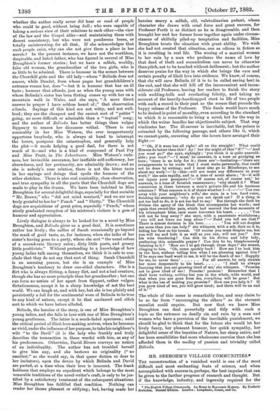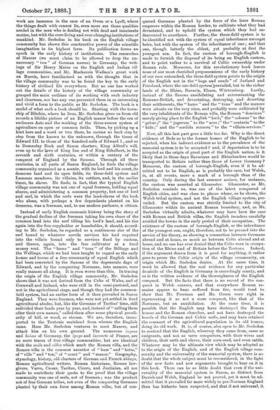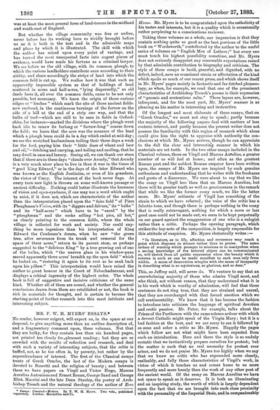MR. SEEBOHM'S VILLAGE COMMUNITIES.*
THE reconstruction of a vanished world is one of the most difficult and most enchanting feats of science, and when accomplished with success is, perhaps, the best impulse that can. be given to the further progress of research and thought. But if the knowledge, industry, and ingenuity required for the • The English Village Community. An Essay in Economic H story. By Frederic- Beebohnt. fieoond Edition. London : Longmana, Green, and Co.
work are immense in the case of an Owen or a Lyell, where the things dealt with cannot lie, even more are those qualities needed in the man who is dealing not with dead and inanimate matter, but with the ever-living and ever-changing institutions of mankind. Mr. Seebohm in his book on the English village community has shown this constructive power of the scientific imagination in its highest form. Its publication forms an epoch in the early history of institutions. The researches of Maurer (we must claim to be allowed to drop the un- necessary " von " of German names) in Germany, the writ- ings of Sir Henry Maine on the English and Indian vil- lage communities, and Mr. Mackenzie Wallace's great work 011 Russia, have familiarised us with the thought that in the village community was to be found the key to the early history of civilised life everywhere. But no one has worked out the details of the history of the village community or grasped the main outlines of its working with such industry and clearness, nor has any one presented them in so interesting and vivid a form to the public as Mr. Seebohm. The book is a model of what such a book should be. Starting with the town- ship of Hitchin, where he lives, Mr. Seebohm gives us from old records a lifelike picture of an English manor before the era of enclosure Acts and the working of the three-course system of agriculture on open or common fields. Then, by picking up a hint here and a word or two there, he carries us back step by step from the known to the unknown, through the times of Edward III. to those of the hundred-rolls of Edward I., and so to Domesday Book and Saxon charters, King Alfred's will, even up to the laws of King Ina and of King Ethelbert, in the seventh and sixth centuries, or within a century of the conquest of England by the Saxons. Through all these centuries, in all parts of Saxon England, he finds the village community organised as a man6r, with its lord and his court, its demesne land and its open fields, its three-field system and Lammas meadows, its villains, its cottiers, and, in the earlier times, its slaves. He finds, in fact, that the typical English village community was not one of equal freemen, holding equal shares, and administering a common property, but one of lord and serf, in which the serfs were the land-slaves of the lord, who alone, with perhaps a few dependants planted on his demesne, was a freeman, and, to use modern parlance, a citizen.
Instead of early English economic history being the story of the gradual decline of the freeman taking his own share of the common land into the serf tilling his lord's land, and his rise again into the free copyholder or leaseholder, it should, accord- ing to Mr. Seebohm, be regarded as a continuous rise of the serf bound to whatever servile services his lord required into the villain bound only to services fixed by custom, and thence, again, into the free cultivator at a fixed money rent. The " hams " and " tons " of the Billings and the Wellings, which we had been taught to regard as the early homes and towns of a free community of equal English which had been converted by the Saxons of the degenerate days of Edward, and by the conquering Normans, into manors, were really manors all along. It is even worse than this. In tracing the origin of the English village community, Mr. Seebohm shows that it VMS not derived from the Celts of Wales, and of Cornwall and Ireland, who were still in the semi-pastoral, and not in the agricultural stage, and though they had the common- field system, had an earlier form of it than prevailed in Saxon England. They were freemen, who were not yet settled in fixed agricultural abodes, but, like the Germans of Tacitus' time, still redivided their lands year by year, and, instead of" calling them after their own names," called them after some physical peculi- arity of hill, or wood, or stream. We are, therefore, trans- ported to the Teutonic mainland from whence the English came. Here Mr. Seebohm ventures to meet Maurer, and attack him on his own ground. The numerous ingens and heinas of Germany, the ignys and incourts of France, are no mere traces of free village communities, but are identical with the mils and vales which mark the Roman villa, and the Roman villa is the common ancestor of " ham " and " heim," of "ville " and "ton," of " court " and "manor." Geography, etymology, history, old charters of German and French abbeys, Roman agricultural writers, Roman historians, Roman law- givers, Varro, Csesar, Tacitus, Cicero, and Justinian, all are made to contribute their quota to the proof that the village community was one of serfs, not of freemen ; was the product not of free German tribes, not even of the conquering Germans planted by their own force among Roman villas, but of con- Tiered Germans planted by the force of the later Roman emperors within the Roman border, to cultivate what they had devastated, and to uphold the system which they had en- deavoured to overthrow. Further, the three-field system is to be identified not with the system of equal inheritance amongst heirs, but with the system of the inheritance of one ; and that one, though latterly the eldest, yet probably at first the youngest son. In fact, the custom of borough-English is made to furnish the disproof of its being an English custom, and to point rather to a survival of Celtic ownership under Roman rule. Moreover, for this revolutionary book leaves none of our most cherished prepossessions of the early history of our race untouched, the three-field system points to the origin of the English not in the "bogs and sands" of Jutland and Friesland, where the one-field system:prevailed, but in the richer lands of the Rhine, Bavaria, Elsass, Wiirtemberg. Lastly, instead of the Saxons annihilating and exterminating the Romano-British, and devastating, destroying, and deserting their settlements, the " hams " and the " tuns " and the manors were situate on the very sites, and probably were cultivated by the very inhabitants of the Roman villa, the Roman " dominue merely giving place to the English "lord;" the" colonus " to the " gebur ;" the " jugerum " to the "acre ;" the" centaria" to the "hide ;" and the " sordida munera," to the "villain-services."
Now, all this last part goes a little too far. Why is the direct evidence of Bede as to the former homes of the English to be rejected, when his indirect evideneS as to the prevalence of the manorial system is to be accepted? and, if deportation is to be accepted as the origin of great part of the English nation, is it likely that in those days Bavarians and Rhinelanders would be transported to Britain rather than those of Lower Germany Moreover, the custom of borough-English, even if it be ad- mitted not to be English, as is probably the case, but Welsh, is, at all events, more a mark of a borough than of the country. Only during the last summer assizes, for instance, the custom was asserted at Gloucester. Gloucester, as Mr.. Seebohm reminds us, was one of the latest conquered of English cities, and was close to places where, as he shows, the- Welsh tribal system, and not the English village system, pre- vailed. But the custom was strictly limited to the city of Gloucester within its ancient Roman boundary, and, as Mr. Seebohm virtually admits, whatever may have been the case with Roman and British villas, the English invaders carefully avoided the towns in the early period of their occupation. The existence of the custom of borough-English, or the inheritance of the youngest son, ought, therefore, not to be pressed into the service of his theory, as showing a connection between Germans abroad and at home, so much as between Celts abroad and at home, and no one has ever denied that the Celts were in occupa- tion of the Rhine and of Britain before the Teutons. Indeed, if the argument drawn from it is good for anything, it rather goes to prove the Celtic origin of the village community, an origin which Mr. Seebohm denies. At the same time, it must be allowed that the real evidence for any particular domicile of the English in Germany is exceedingly scanty, and so is the written evidence of the thoroughness of the English conquest. But the facts that there is no record of the con- quest in Welsh sources, and that everywhere Roman re- mains appear to have suffered from fire, would tend to show that Mr. Freeman and Mr. Green were right in representing it as not a mere conquest, like that of the Normans, but an annihilation. At the same time, it is possible that the English may have destroyed the Roman houses and the Roman churches, and not have destroyed the hovels of the German and Celtic serfs, and may have retained the remnant of the agricultural population in its old homes,. doing its old work. It is, of course, also open to Mr. Seebohm to contend that the English, wherever they came from, came as emigrants, and not as mere conquerors, with their wives and children, their serfs and slaves, their corn-seed, and even cattle. Whatever may be the ultimate view which may be adopted as to the origin of the English, and of the English village com- munity and the universality of the manorial system, there is no doubt that the whole subject must be reconsidered, in the light of the new facts and new arguments brought to bear on it in this book. There can be as little doubt that even if the uni- versality of the manorial system in Saxon, as distinct from Danish and Welsh, England be not proved, yet it must be ad- mitted that it prevailed far more widely in pre-Norman England than has hitherto been suspected, and that if not universal, it
was at least the most general form of laud-tenure in the midland and south-east of England.
But whether the village community was free or unfree, never before has its working been so vividly brought before us as it is both in the text and in the admirable maps and plans by which it is illustrated. The skill with which the author has seized upon every point of vantage, and has turned the most unexpected facts into cogent pieces of evidence, would have made his fortune as a criminal lawyer. We see before us the old village, with its common plough, to which the various landholders contribute oxen according to their ability, and share accordingly the strips of land into which the common field is cut up. We realise how it was that such an apparently impossible system as that of holdings of land scattered in acres and half-acres, "lying dispersedly," as old deeds have it, all over the common fields, came to be not only possible, but necessary. We learn the origin of those curious ridges or " linches " which mark the site of those ancient fields, now enclosed, in the continuous turnings of the furrow on the side of a hill at the end of a strip one way, and that the balks of turf—which are still to be seen in fields in Oxford- shire, for instance—marked the divisions where the plough went back idle to renew its furlong or " furrow-long " course down the field; we learn that the acre was the measure of the land which a plough team could do in a day which ended at mid-day; we see the wretched husbandmen toiling their three days a week for the lord, paying him their "little dues of wheat and beer and oil,"—fetching and carrying, and toiling and moiling, that he may dwell in ease and luxury. Seeing all, we can thank our stars that if there are in these days "clouds over Arcady," that Arcady is a very much nicer place to live in than it was in the times of "good. King Edward," or in the days of the later Edward who was known as the English Justinian, or even of his grandson, the victor of Crecy. The interest of the book never flags. At every turn new light is thrown on some well-known passage or ancient difficulty. Nothing could better illustrate the keenness of vision and open-eyedness, if one may use a word which ought to exist, if it does not, which are characteristic of the author than the interpretation placed upon the "faire field." of Piers Ploughman's Vision, with its "diggers and delvers," its " balks " and its " half-acres " which have to be " eared " by the "ploughman" and the cooks selling "hot pies, all hot," as clearly pointing to the common fields, where the whole village is collected for work and society. Nor could any- thing be more ingenious than his interpretation of King Edward the Confessor's dream, when he saw "the green tree, after severance from its trunk and removal for the space of three acres," return to its parent stem, as perhaps suggested to the "delirious King" by a tree growing out of one of the balks, which "the uneven glass in his window-pane moved apparently three acres' breadth up the open field " which he looked on, "restoring it again to its root as he sank back upon his pillow." This interpretation would have raised the author to great honour in the Court of Nebuchadnezzar, and displays a critical ingenuity of the highest order. The whole book is full of suggestive and incisive criticisms of the same kind. Whether all of them are sound, and whether the general conclusions drawn from them are established or not, the book is rich in materials for thought, and is certain to become the starting-point of further research into this most intricate and interesting subject.




































 Previous page
Previous page